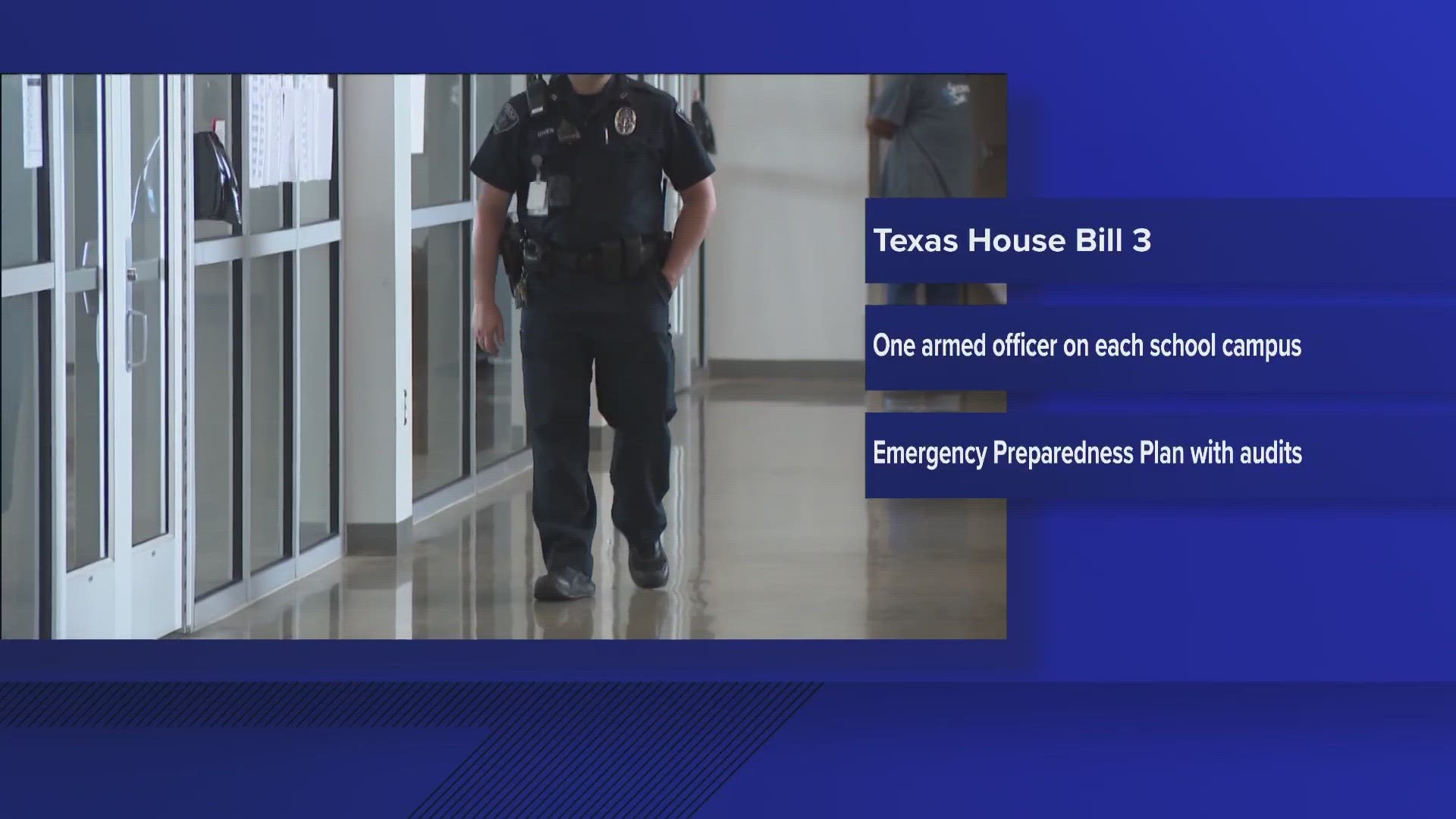AUSTIN, Texas — (THE TEXAS TRIBUNE) Texas lawmakers sent a sweeping school safety measure to Gov. Greg Abbott on Sunday, including in their response to last year’s Uvalde massacre a requirement to post an armed security officer at every school and provide mental health training for certain district employees.
The measure also gives the state more power to compel school districts to create active-shooter plans.
Both chambers gave their final approval to House Bill 3 after ironing out their differences over the past week.
“It’s time to act,” said Rep. Ken King, R-Canadian, before the vote was taken. “We need to prevent the next Uvalde.”
The provision to require an armed person at every school campus was added back into the bill during the negotiation process after the Senate took it out earlier in the session. The armed person can be either a peace officer, a school resource officer, a school marshal or a school district employee, according to the law.
That provision caused the most consternation among the opponents of the bill, who have argued all through the legislative session that fewer guns — not more — is the solution to mass shootings. Still, the bill passed by a relatively large margin in the House, 93-49.
Rep. Vikki Goodwin, D-Austin, said requiring an armed person at schools will endanger students instead of ensuring their safety.
“The potential for disastrous consequences is staggering,” Goodwin said.
The proposal requires the Texas School Safety Center — a Texas State University think tank that has been reviewing schools’ safety protocols since the 2018 Santa Fe High School shooting — to review best practices to best secure campuses every five years. In the Uvalde shooting, the gunman entered Robb Elementary through a backdoor that failed to properly lock. The bill would also create regional safety teams that would conduct intruder detection audits at least once a year.
HB 3 would create a safety and security department within the Texas Education Agency and give it the authority to compel school districts to establish robust active-shooter protocols and follow them. Those that fail to meet the agency’s standards could be put under the state’s supervision.
The bill would also require the TEA to develop standards for notifying parents of “violent activity” on campus and set up school safety review teams to conduct vulnerability assessments of all the school campuses once a year.
Both chambers have said school safety is a priority this session after a gunman killed 19 children and two teachers at a Uvalde elementary school last year. However, parents of the Uvalde victims were left disappointed after the raise-the-age bill they advocated for failed earlier in the session. The bill would have changed the age to legally purchase semi-automatic rifles from 18 to 21.
To further harden schools, the state would give each school district $15,000 per campus and $10 per student, a figure that many school officials say isn’t enough. In addition, lawmakers have allocated $1.1 billion to the TEA to administer school safety grants to the state’s more than 1,000 school districts.
Sen. Roland Gutierrez, a San Antonio Democrat who represents Uvalde, said Sunday that he voted against the bill because of the funding concerns.
“It is sick and twisted that we have the largest budget surplus in Texas history and we aren’t doing a damn thing to keep our kids safe,” he said. “We aren’t doing anything to prevent another Uvalde.”
Under the bill, school employees who regularly interact with children would need to complete an “evidence-based mental health first-aid training program.” The TEA would reimburse the employee for the time and money spent on the training.
In counties with fewer than 350,000 people, the bill requires the sheriff to hold semi-annual meetings to discuss school safety and law enforcement response to “violent incidents.” This includes making sure there is a clear chain of command and that all radios are working.
In the aftermath of the Uvalde shooting last year, nearly 400 law enforcement officers from different agencies descended upon Robb Elementary in a chaotic, uncoordinated scene that lasted for more than an hour.
Each district would also be required to give the Department of Public Safety and other law enforcement a walkthrough and a map of each campus in an effort to avoid confusion when responding to an incident.
“This is a huge win for the safety of our children,” said Rep. Carrie Isaac, R-Dripping Springs.
This article originally appeared in The Texas Tribune.

